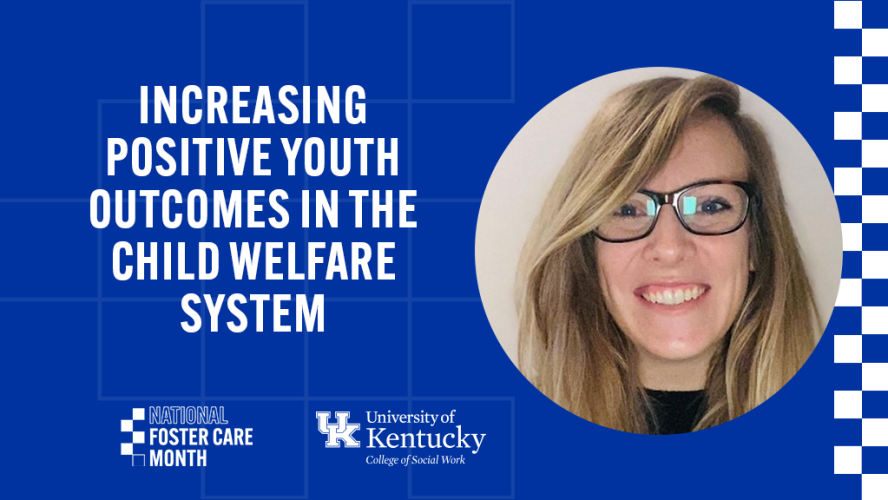LEXINGTON, Ky. – Improving outcomes within the child welfare system is what brought Taylor Dowdy-Hazlett, assistant professor at the University of Kentucky College of Social Work, to Lexington. Focusing on positive youth outcomes, Dowdy-Hazlett continues to further her research to cultivate a better system for foster children.
Dowdy-Hazlett comes to the CoSW with a wealth of experience in the child welfare field, earning her Bachelor and Master of Social Work, as well as her PhD. She has also worked for the Department for Community Based Services and in residential treatment and clinical therapy.
Through these experiences over her career, Dowdy-Hazlett knew she wanted to make a larger imprint on the child welfare system.
“I really saw the holes in the child welfare system and knew that I wanted to make a bigger impact,” Dowdy-Hazlett said. “I had a lot of questions and I wanted to answer those questions. That’s when I decided to pursue my PhD and now, I’m doing research.”
Working with the Foster Parent Mentor Program (FPMP) at the CoSW, Dowdy-Hazlett is focused on improving retention for foster parents to mitigate turnover and decrease the amount of placement disruptions for youth.
As part of this research, the FPMP is evaluating the mentorship program and asking mentors and mentees to complete surveys to see the impact of the mentor program on various items related to support and their satisfaction with being foster parents.
“Thirty to 50 percent of youth coming into foster care will experience at least one placement disruption and if they move placement once, they are at an increased risk for continuing to move placements,” Dowdy Hazlett said. “I am focusing on trying to stabilize foster parents by understanding their needs and how we can meet those needs through training or support services and resources.”
Dowdy-Hazlett is also collaborating with Dr. Tanya Renn, assistant professor in the College of Social Work at Florida State University. Together, they are working with Boys Town, a residential treatment organization in Florida, delivering a group therapy intervention called Cognitive Behavioral Intervention for Trauma and Schools (CBITS). This intervention was originally developed for schools but has now been modified so it fits more in a community-based setting.
Working with Boys Town, CBITS involves a pretest before the intervention and then a posttest following the intervention. Those tests are measuring youth trauma symptoms, substance misuse, and anxiety and depression. These tests demonstrate if CBITS is working and how the intervention can be expanded to offer it to more youth in foster care.
The goal with this research? Creating a system where there are healthy, happy, well-rounded youth who come out of the child welfare system that haven’t been further traumatized.
“Best supporting foster children begins with supporting foster parents. We need to offer foster parents more opportunities for training, offer higher stipends to cover the cost of living for the youth in their care, and increase the number of hours and days they can have respite care, so that they can focus on their well-being and self-care and feel rejuvenated and ready to take care of these children,” Dowdy-Hazlett said.
Offering more opportunities for support, whether that be through mentorship or opportunities to get together with other foster parents are other ways to best support foster parents, Dowdy-Hazlett mentioned.
As National Foster Care Month ends in May, Dowdy-Hazlett recognizes the month’s significance and the importance of support for foster families year-round.
“National Foster Care Month highlights the importance of the work that foster parents are doing because without foster parents, we wouldn’t have a child welfare system,” Dowdy-Hazlett said. “It also highlights the resiliency in the youth that we work with and the continuous need we have to improve the child welfare system for these children.”






